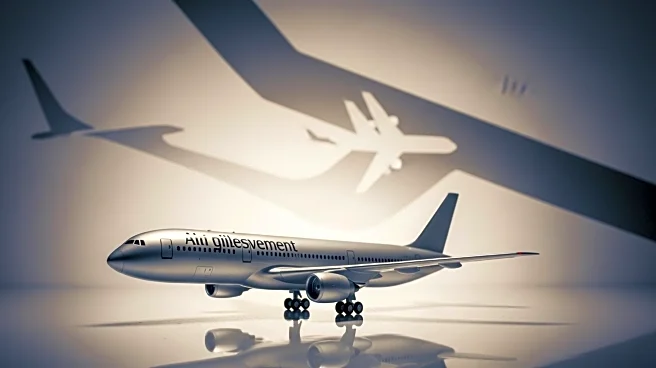What's Happening?
Airbus has achieved a significant milestone with its A320 family of aircraft surpassing the Boeing 737 to become the most-delivered jetliner in history. This achievement was marked by the delivery of an A320 to Saudi carrier Flynas, bringing the total deliveries to 12,260 since the aircraft's introduction in 1988. The A320 was initially launched in 1984, and despite initial skepticism, it has become a cornerstone of Airbus's success. The aircraft was notable for introducing fly-by-wire computer controls, a technology that faced initial resistance but later gained widespread acceptance. Airbus is currently expanding its production capabilities in the United States and China, further solidifying its position in the global aerospace market.
Why It's Important?
This development underscores a significant shift in the aerospace industry, highlighting Airbus's growing influence and the challenges faced by Boeing. The A320's success reflects Airbus's strategic innovations and adaptability in a competitive market. For Boeing, this marks a critical point as it continues to recover from the setbacks caused by the 737 MAX incidents in 2018 and 2019. The shift in delivery leadership could impact market dynamics, influencing airline purchasing decisions and potentially affecting Boeing's market share. The increased production of A320s in the U.S. and China also indicates Airbus's commitment to strengthening its global presence, which could have long-term implications for the aerospace industry.
What's Next?
Airbus's continued expansion in production facilities in the U.S. and China suggests a strategic focus on increasing its market share and meeting growing demand. For Boeing, the challenge will be to restore confidence in its 737 line and regain its competitive edge. The company is working to increase production under regulatory constraints, aiming to stabilize its position in the market. The competition between these two aerospace giants is likely to intensify, with both companies seeking to innovate and capture emerging opportunities in the aviation sector.
Beyond the Headlines
The rivalry between Airbus and Boeing is emblematic of broader trends in global manufacturing and trade. Airbus's success with the A320 highlights the importance of technological innovation and strategic market positioning. The shift in leadership also raises questions about the future of aerospace manufacturing, particularly in terms of sustainability and environmental impact. As both companies navigate these challenges, their strategies could influence industry standards and regulatory frameworks, shaping the future of air travel.









